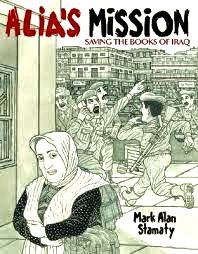THE WAR AGAINST BOOKS
Nothing remains of the Great Library of Alexandria in Egypt, where thousands of irreplaceable papyrus scrolls were turned to ash after a series of Roman conquests.

Nalanda, a major repository of Buddhist knowledge and other ancient writings in India, was first ransacked by invading Huns and then destroyed in 1193 by invading Turks. (Good news, it reopened in 2014.
Christian Crusaders destroyed the Imperial Library of Constantinople in 1204.
In 1258, the House of Wisdom (Nizamiyah) was burned to the ground in Baghdad during a Mongol invasion. Thousands of books were thrown into the Tigris River, turning the water inky black.
A Franciscan monk ordered the burning of all ancient Mayan texts, during the Spanish conquest of the Yucatán in 1562.
The British burned down the Royal Library of the Kings of Burma in 1885.
Japanese soldiers in WWII destroyed numerous libraries throughout China.
The Khmer Rouge ravaged the National Library of Cambodia in the 1970s.
In the 1980s, Indira Gandhi gave the order to destroy the Sikh Reference Library in Punjab.
During the Siege of Sarajevo, in 1992, the Bosnian Serb Army gutted the National Library of Bosnia and Herzegovina.
And just last year, a library was destroyed in Tripoli when 80,000 books and rare manuscripts went up in flames at the hands of Islamic extremists.
And this is only a partial list. Warring humans of all stripes destroy libraries.
NAZI CENSORS CRIED “BURN”

Crowded street in the Vilna Ghetto
Is it any wonder that librarians are sometimes called upon to be brave, speak against censorship, or come to the aid of books and book lovers?
Ona Šimaitė (1894-1970) was stocky and drab. No one gave her a second look, not even the SS guards at the gates of the Vilna Ghetto. Šimaitė used this to her advantage.
A librarian at Vilnius University in the capital of Lithuania, she repeatedly ventured into the walled ghetto on the pretext of collecting overdue books. The Jews who were corralled there lived on top of each other, until they were escorted in small groups out into the woods to be massacred.

The Nazis smirked at Šimaitė, fussing over a few books. After all, they regularly burned great heaps of books and, in 1941, looted and destroyed the world’s largest library of Jewish learning, the Strashun Library, a landmark in Vilna.
Under her lumpy coat, Šimaitė smuggled in food, medicine, money, and counterfeit documents. She carried out letters, precious manuscripts, rare books, and, at least once, a young woman.
In 1944, she was found out, arrested, and tortured, hung upside down and questioned for days, the soles of her feet burned with hot irons. She survived the war, but never regained her health. Nor did she write much about her heroic actions. Instead, she wrote letters, often twenty a day, to other survivors, offering comfort and encouragement. Her story of quiet courage has only recently been pieced together.
GOD SAID “READ”

“In the Koran, the first thing God said to Muhammad was ‘Read!.’” That’s what Alia Muhammad Baqer (Baker) told a reporter for The New York Times.
Baqer was the chief librarian of the Central Library in Basra, Iraq when the Bush administration led a coalition of nations into the Iraq War. The stated mission was to find weapons of mass destruction and end Saddam Hussein’s rule.
Illustration by Jeanette Winter from “The Librarian of Basra”
Illustration by Jeanette Winter from “The Librarian of Basra”

As talk of war increased, the governor moved his offices into the library and mounted machine guns on the roof. Baqer worried that this made the library a target for invading armies.
When the governor refused permission for the books to be moved to another location, Baqer took the law into her own hands. No one noticed when she left work with her handbag stuffed full of books, others hidden under her shawl. She loaded them into her car, then returned for more, walking quietly past government officials too busy to notice.
Once home, her husband helped her stack the books in a closet. Over the course of several days, she brought home enough books to fill every closet, the guest room, and hallways.
As British forces approached, looters went wild. They got into the library and took everything they could put their hands on — staplers, coffee machines, tables, lamps, chairs. They took everything but the books.

When bombs began to fall, Baqer organized the library staff and book-loving neighbors. Together, they passed books out of the library, over a wall, and into the restaurant of a friend. They worked until midnight and promised to return in the morning.
That night, however, the library was hit. All the remaining books were destroyed in a fire that leveled the building. Terrified, in tears, and exhausted, Baqer had a stroke and was rushed to the hospital. Fortunately, she recovered enough to oversee the distribution of the books to temporary shelters. Her efforts saved 30,000 books.
Though she continued to grieve all the books not saved, Baqer looked ahead to the day when the people of Basra could live in peace and walk through the doors of a fully restored library full of books.
Ona Šimaitė
“Ona Šimaitė and the Vilnius Ghetto: An Unwritten Memoir” by Julija Sukys, Lithuanian Quarterly Journal of Arts and Sciences, Summer, 2008.
Epistolophilia: Writing the Life of Ona Simaite by Julija Sukys, University of Nebraska Press, 2012 (a remarkable book about the challenges of researching the life of a quietly courageous woman)
Nazi Book Burning (9:41 mins) Short documentary by the U.S. Holocaust Memorial Museum.
Alia Muhammad Baqer (Baker)
“After the War: The Librarian; Books Spirited to Safety Before Iraq Library Fire” by Shaila K. Dwan, The New York Times, July 27, 2003
“After the War: The Librarian; Books Spirited to Safety Before Iraq Library Fire” by Shaila K. Dwan, The New York Times, July 27, 2003
 “Iraqi Librarian Saved 30,000 Books During 2003 Invasion” in Al Arabiya News, March 17, 2013
“Iraqi Librarian Saved 30,000 Books During 2003 Invasion” in Al Arabiya News, March 17, 2013 Alia’s Mission: Saving the Books of Iraq written and illustrated by Mark Alan Stamaty (graphic novel), 2004, Knopf Books for Young Readers.
Alia’s Mission: Saving the Books of Iraq written and illustrated by Mark Alan Stamaty (graphic novel), 2004, Knopf Books for Young Readers.
The Librarian of Basra: A True Story from Iraq, written and illustrated by Jeanette Winter (picture book) 2005, Harcourt, Inc.
The Librarian of Basra, a picture book by Jeanette Winter, read aloud by Diane Santiago, with sound effects. (4:45 mins)
OTHER
 For more about the Reach Out and Read program which aims to increase early childhood literacy, go to this website: http://www.reachoutandread.org
For more about the Reach Out and Read program which aims to increase early childhood literacy, go to this website: http://www.reachoutandread.org

